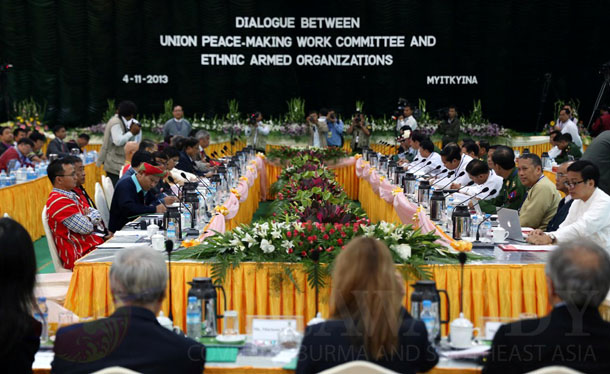Elusive Nationwide Ceasefire Agreement Continues to Distract from Substantial Peace Talks
By Burma Partnership • August 26, 2014 As talks over the signing of a nationwide ceasefire agreement (NCA) are delayed once again, thus pushing substantive dialogue further into the future, Burma’s decades long civil war rages on in Kachin and Shan States.
As talks over the signing of a nationwide ceasefire agreement (NCA) are delayed once again, thus pushing substantive dialogue further into the future, Burma’s decades long civil war rages on in Kachin and Shan States.
Talks over the signing of the NCA have now gone on for nearly 18 months and the situation on the ground has still not changed. The Burma Army continues to attack ethnic armed groups in areas where ceasefires have been signed, such as those of the Shan State Army South and Shan State Army North, as well as continuing offensives against the Kachin Independence Army and the Ta’ang National Liberation Front (TNLA) where there is no ceasefire. On Monday 18 August, a civilian in Namkan Township, Shan State was shot dead and another hospitalized after a clash between the TNLA and Burma Army. Human rights violations such as sexual violence, arbitrary arrest, torture and extrajudicial killing continue in these active conflict areas, while in areas where individual ceasefires are holding, the Burma Army is entrenching its power both militarily and economically through land confiscation and reinforcement of its positions.
The aim in this pursuit of the NCA is questionable as it distracts from the real issues at hand that prevent the ethnic people of Burma from enjoying genuine peace. Let us not forget that the Burma government has already signed ceasefire agreements with most ethnic armed groups. But has this stopped the attacks and human rights violations inflicted on local communities by armed forces? This question cannot be answered in the affirmative. Just ask the villagers who live in Murng Hsu, Shan State, whose homes came under artillery attack, and were forced to act as guides for the Burma Army in June of this year in a supposed ceasefire area. If all groups sign on to the NCA, the biggest question is how can they trust that the Burma Army will actually cease its attacks. There is scant evidence of this from current and previous ceasefires.
The NCA in its current draft talks of the agreement to draw up codes of conduct, monitoring of the ceasefire and to enter political dialogue within 90 days. This is all very well, but an agreement to draw up codes of conduct and lines of demarcation isn’t actually establishing codes of conduct. When will this actually happen if it has already taken 18 months to simply agree in principle to do it?
The key problem, however, is political dialogue. As it stands, the framework to engage in political dialogue must be completed within 60 days of signing the NCA and the dialogue itself must be commenced within 90 days of the signing. The question must be asked as to how realistic this is. If it has taken 18 months to get to this point, where further talks need to be scheduled to finalize the agreement, will political dialogue, and all this entails, including the development of a federal system, resource sharing, greater autonomy for regional legislatures, and reduction of the power of the Burma Army, really be finalized in an election year? Will the Burma Army really relinquish power just before the 2015 general elections? Will they be willing to change the fraudulent 2008 Constitution that the National League for Democracy (NLD) and the 88 Generation Peace and Open Society Group have been campaigning for the past few months, gaining millions of signatures? Because this is the key. If the 2008 Constitution is not changed, sustainable peace will not be achieved, and the government can be lauded for the public signing of the NCA but if it does not actually precede substantive change, the communities that have suffered for so long in ethnic areas will continue to suffer at the hands of the Burma Army while natural resources in these areas will continue to be exploited.
The NCA is a sideshow, a smokescreen that disguises the structural reasons that mean there is no peace in Burma today. Unfortunately this process has been the focus for the ethnic armed actors involved in negotiations, as well as much of the media attention. It has the potential to serve as a reason for elements within the international community to claim peace in Burma while they reap the rewards of investment in the rich natural resources in ethnic areas.
It is imperative that efforts and energy are reinvested in a genuine peace process, one that will constitute actual and substantial change that guarantees equality and serves as a point of healing for the long suffering ethnic people. The international community must recognize what the NCA actually is, an agreement in principle with the government, and as yet not the Burma Army who hold the real power in this charade of a peace process, to proceed with further talks. This is merely a starting point. Structural change that guarantees the rights and equality of ethnic people through a power sharing agreement has yet to commence. This involves changing the 2008 Constitution as a priority. Once the 2008 Constitution is changed, then we can say that a peace process has begun in earnest.
Tags: 2008 Constitution, 88 Generation Peace and Open Society, Burma Army, Burma Partnership, Ceasefire Agreement, Government of Myanmar, Human Rights Violations, Kachin Independence Army, National League for Democracy, Nationwide Ceasefire Agreement, Peace Talks, Shan State Army-North, Shan State Army-South, Ta'ang National Liberation FrontThis post is in: Blog
Related PostsMyanmar: Release Four “Rohingya Calendar” Political Prisoners
Burma: Rights Priorities for New Government
Myanmar: Scrap or Amend new Law that could Grant Immunity to Former Presidents
Burma Army Moves to Tighten Grip on Power
Sounds of War Taint the Cheers of Election Success









 All posts
All posts